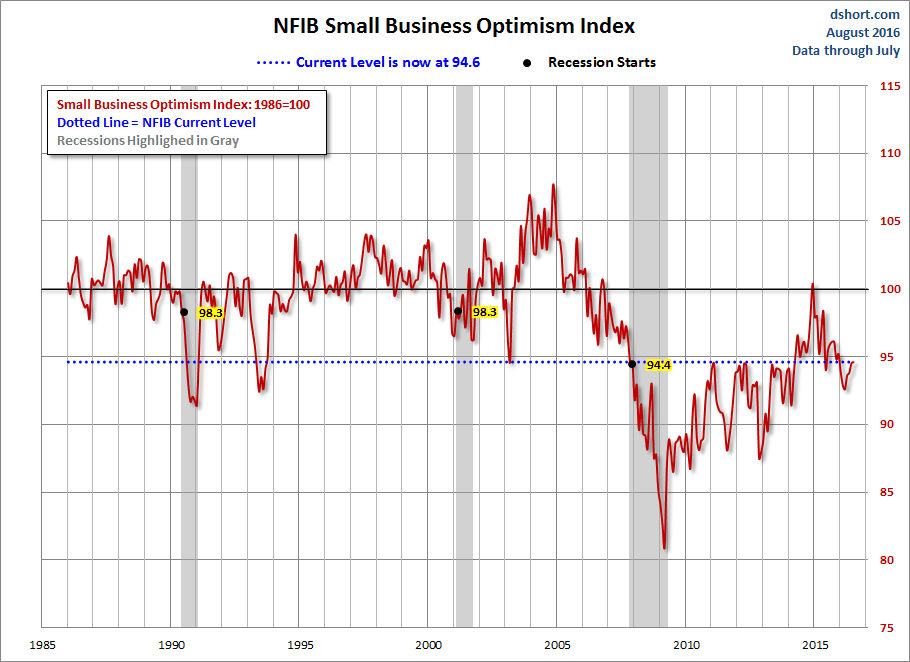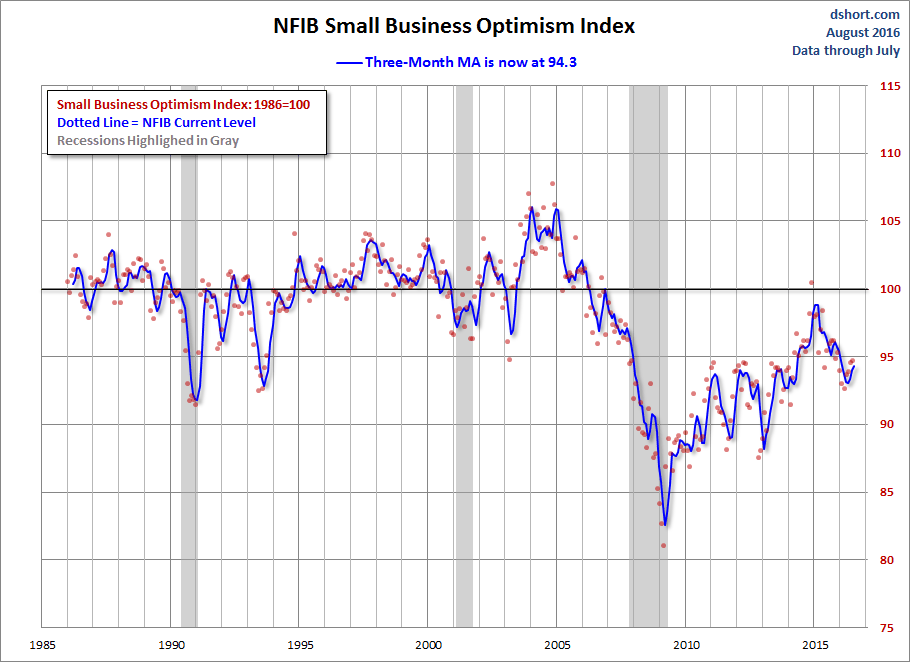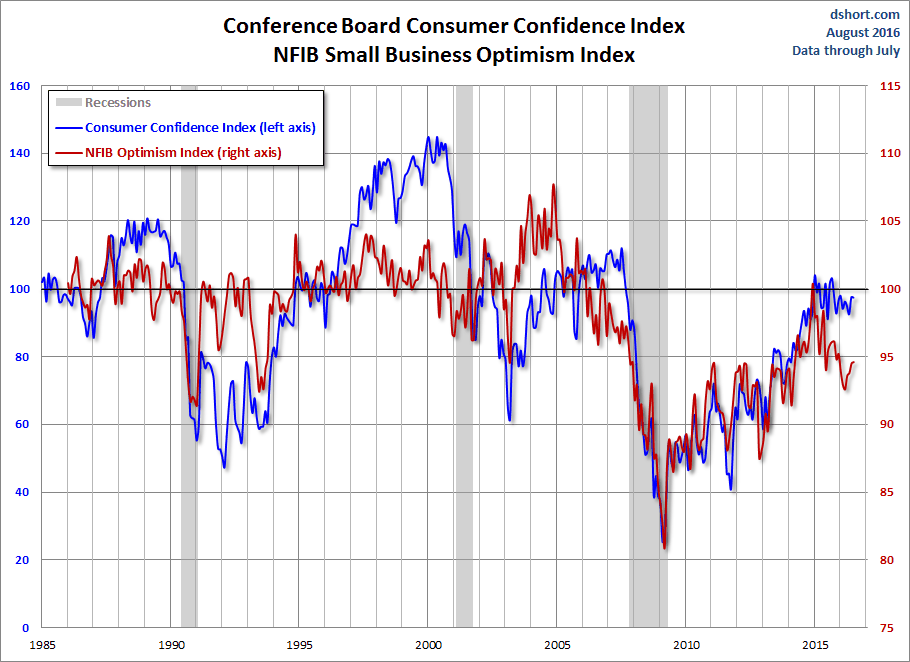The latest issue of the NFIB Small Business Economic Trends is out today (see report). The July update for June came in at 93.5, down 0.9 points from the previous month. Today's overall number is at the 19.6 percentile in this series -- the top of the lowest quintile in the history of this series. Since its initial recovery following its Great Recession trough, this index has been stuck in an extremely volatile range for the past three years. Since January of 2011, it has four times bumped a ceiling fractionally above its current level and then retreated.
Here is an excerpt from the opening summary of the report:
Small-business optimism remained in tepid territory in June, as NFIB's monthly economic Index dropped just under a point (0.9) and landed at 93.5, effectively ending any hope of a revival in confidence among job creators. Six of the ten Index components fell, two rose and two were unchanged. While job creation plans increased slightly in June, expectations for improved business conditions remained negative. The Index—which was 12 points higher in June than at its lowest reading during the Great Recession but 7 points below the pre-2008 average and 14 points below the peak for the expansion—has been teetering between modest increases and declines for months.
"After two months of incremental but solid gains, the Index gave up in June. This appears par for the course, given that there is no reason for small employers to be more optimistic and lots of things to worry about. Washington remains bogged down in scandals and confidence in government's ability to deal with our fundamental problems remains low. Economic growth was revised down for the first quarter of the year and the outlook for the second quarter is not looking good. Nothing cheers up a small-business owner more than a customer, and they remain scarce and cautious while consumer spending remains weak and more owners are reporting negative sales trends than positive ones. It certainly doesn't help that the endless stream of delays and capitulations of certain provisions of the healthcare law adds to the uncertainty felt by owners. Until growth returns to the small-business half of the economy, it will be hard to generate meaningful economic growth and job creation." -- NFIB chief economist Bill Dunkelberg
The first chart below highlights the 1986 baseline level of 100 and includes some labels to help us visualize that dramatic change in small-business sentiment that accompanied the Great Financial Crisis. Compare, for example the relative resilience of the index during the 2000-2003 collapse of the Tech Bubble with the far weaker readings of the past four years. The NBER declared June 2009 as the official end of the last recession.
The average monthly change in this indicator is 1.29 points. To smooth out the noise of volatility, here is a 3-month moving average of the Optimism Index along with the monthly values, shown as dots.
Inventories And Sales
The findings on small business sales and sales expectations continue to highlight a fundamental source of distress.
The net percent of all owners (seasonally adjusted) reporting higher nominal sales in the past 3 months compared to the prior 3 months gave up 4 points, falling to a negative 8%. Eighteen (18) percent still cite weak sales as their top business problem, historically high, but far better than the record 34% reading last reached in March 2010....
For all firms, a net negative 2% (down 3 points) reported stocks too low, a sharp deterioration from May and consistent with weak spending which produces a buildup in stocks. This produced a sharp decline in the net percent of owners planning to add to inventories, falling 4 points to a negative 1% of all firms (seasonally adjusted). Apparently the optimism of the past few months did not come to fruition, producing a sharp reversal in the outlook for inventory spending.
Credit Markets
Has the Fed's strategy of quantitative easing had a positive impact on Small Businesses?
Five percent of the owners reported that all their credit needs were not met, unchanged and the lowest reading since February 2008. Twenty-nine (29) percent reported all credit needs met, and 53% explicitly said they did not want a loan. Only 2% reported that financing was their top business problem compared to 20% citing taxes, 18% citing weak sales and 20% citing regulations and red tape.
NFIB Commentary
This month's "Commentary" section offers a interesting context for the June data:
The revision of first quarter GDP growth to an anemic 1.8% at an annual rate confirms that the economy is growing at a very slow pace, not enough to produce many new jobs. The largest contributor to the negative revision was consumer spending, in particular to spending on services, which account for about 70% of consumer spending. This sector is very labor intensive and a revival of spending there would certainly improve job creation....
The economy remains "bifurcated", with the big firms producing most of the GDP growth with little help from small business. That balance is shifting, but unfortunately because larger firms are losing ground, not because small business is growing faster. Housing and energy are helping, and that does involve a lot of small businesses but the rout in housing was so severe that there are now supply constraints developing in new home construction due to lost capacity that cannot be easily reconstituted. Home prices are now increasing at double digit rates. Consumer net worth is allegedly doing well due to stock prices and house prices rising. But the quantity of items held, real wealth (houses, cars, fractions of a company owned), is not increasing that fast, just the prices. Been there, done that.
Business Optimism and Consumer Confidence
The next chart is an overlay of the Business Optimism Index and the Conference Board Consumer Confidence Index. The consumer measure is the more volatile of the two, so I've plotted it on a separate axis to give a better comparison of the volatility from the common baseline of 100. 
These two measures of mood have been highly correlated since the early days of the Great Recession, although we see a bit of contrast in the latest readings of the two. Last month Consumer Confidence hit a post-recession high, but Small Business keeps bumping a ceiling just above its current level. It will be particularly interesting to see if the consumer's optimism continues to increase in the months ahead.
- English (UK)
- English (India)
- English (Canada)
- English (Australia)
- English (South Africa)
- English (Philippines)
- English (Nigeria)
- Deutsch
- Español (España)
- Español (México)
- Français
- Italiano
- Nederlands
- Português (Portugal)
- Polski
- Português (Brasil)
- Русский
- Türkçe
- العربية
- Ελληνικά
- Svenska
- Suomi
- עברית
- 日本語
- 한국어
- 简体中文
- 繁體中文
- Bahasa Indonesia
- Bahasa Melayu
- ไทย
- Tiếng Việt
- हिंदी
Small Business Sentiment: A Decline After Two Months Of Increase
Published 07/09/2013, 08:46 AM
Updated 07/09/2023, 06:31 AM
Small Business Sentiment: A Decline After Two Months Of Increase
3rd party Ad. Not an offer or recommendation by Investing.com. See disclosure here or
remove ads
.
Latest comments
Install Our App
Risk Disclosure: Trading in financial instruments and/or cryptocurrencies involves high risks including the risk of losing some, or all, of your investment amount, and may not be suitable for all investors. Prices of cryptocurrencies are extremely volatile and may be affected by external factors such as financial, regulatory or political events. Trading on margin increases the financial risks.
Before deciding to trade in financial instrument or cryptocurrencies you should be fully informed of the risks and costs associated with trading the financial markets, carefully consider your investment objectives, level of experience, and risk appetite, and seek professional advice where needed.
Fusion Media would like to remind you that the data contained in this website is not necessarily real-time nor accurate. The data and prices on the website are not necessarily provided by any market or exchange, but may be provided by market makers, and so prices may not be accurate and may differ from the actual price at any given market, meaning prices are indicative and not appropriate for trading purposes. Fusion Media and any provider of the data contained in this website will not accept liability for any loss or damage as a result of your trading, or your reliance on the information contained within this website.
It is prohibited to use, store, reproduce, display, modify, transmit or distribute the data contained in this website without the explicit prior written permission of Fusion Media and/or the data provider. All intellectual property rights are reserved by the providers and/or the exchange providing the data contained in this website.
Fusion Media may be compensated by the advertisers that appear on the website, based on your interaction with the advertisements or advertisers.
Before deciding to trade in financial instrument or cryptocurrencies you should be fully informed of the risks and costs associated with trading the financial markets, carefully consider your investment objectives, level of experience, and risk appetite, and seek professional advice where needed.
Fusion Media would like to remind you that the data contained in this website is not necessarily real-time nor accurate. The data and prices on the website are not necessarily provided by any market or exchange, but may be provided by market makers, and so prices may not be accurate and may differ from the actual price at any given market, meaning prices are indicative and not appropriate for trading purposes. Fusion Media and any provider of the data contained in this website will not accept liability for any loss or damage as a result of your trading, or your reliance on the information contained within this website.
It is prohibited to use, store, reproduce, display, modify, transmit or distribute the data contained in this website without the explicit prior written permission of Fusion Media and/or the data provider. All intellectual property rights are reserved by the providers and/or the exchange providing the data contained in this website.
Fusion Media may be compensated by the advertisers that appear on the website, based on your interaction with the advertisements or advertisers.
© 2007-2024 - Fusion Media Limited. All Rights Reserved.
